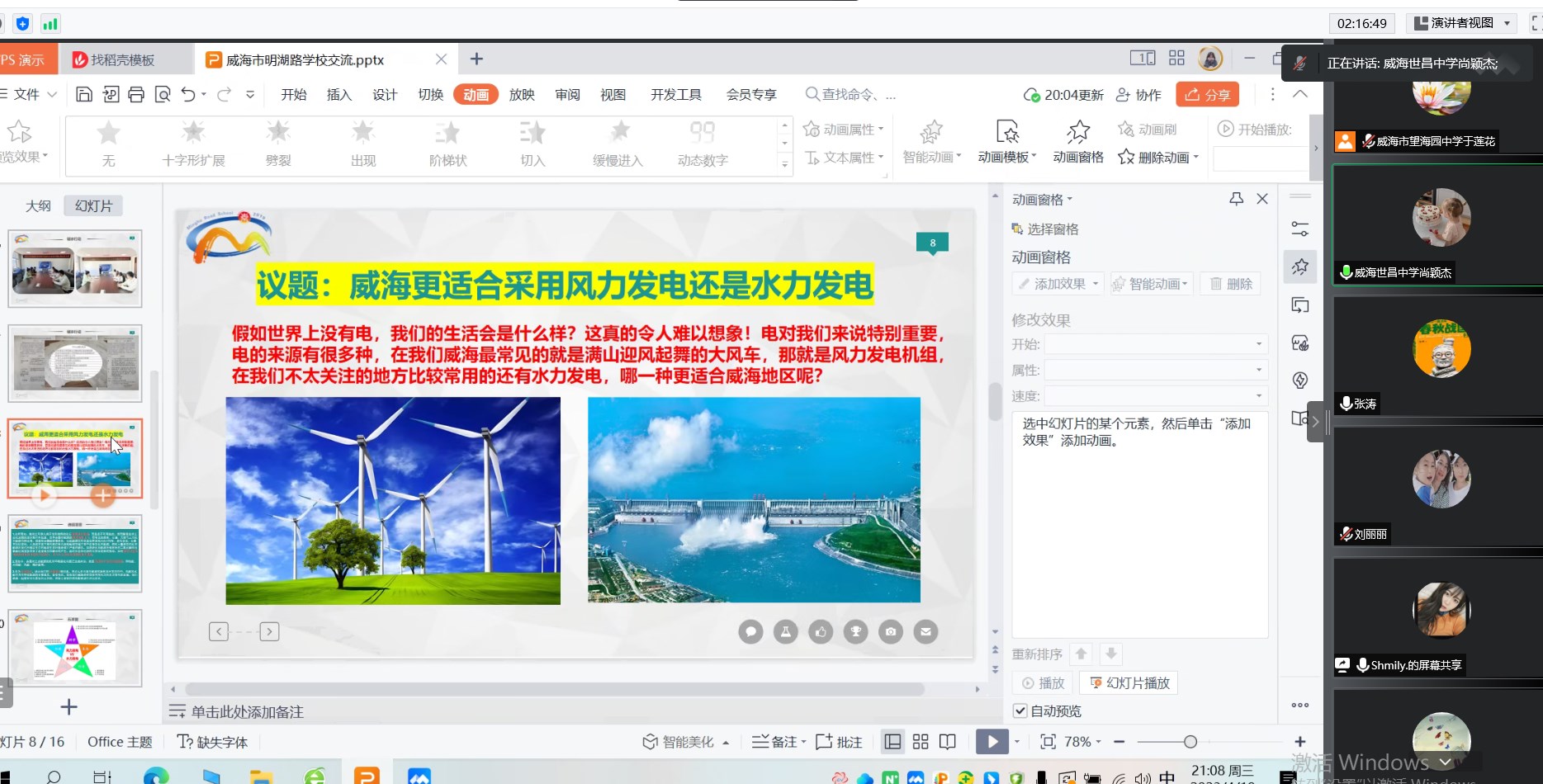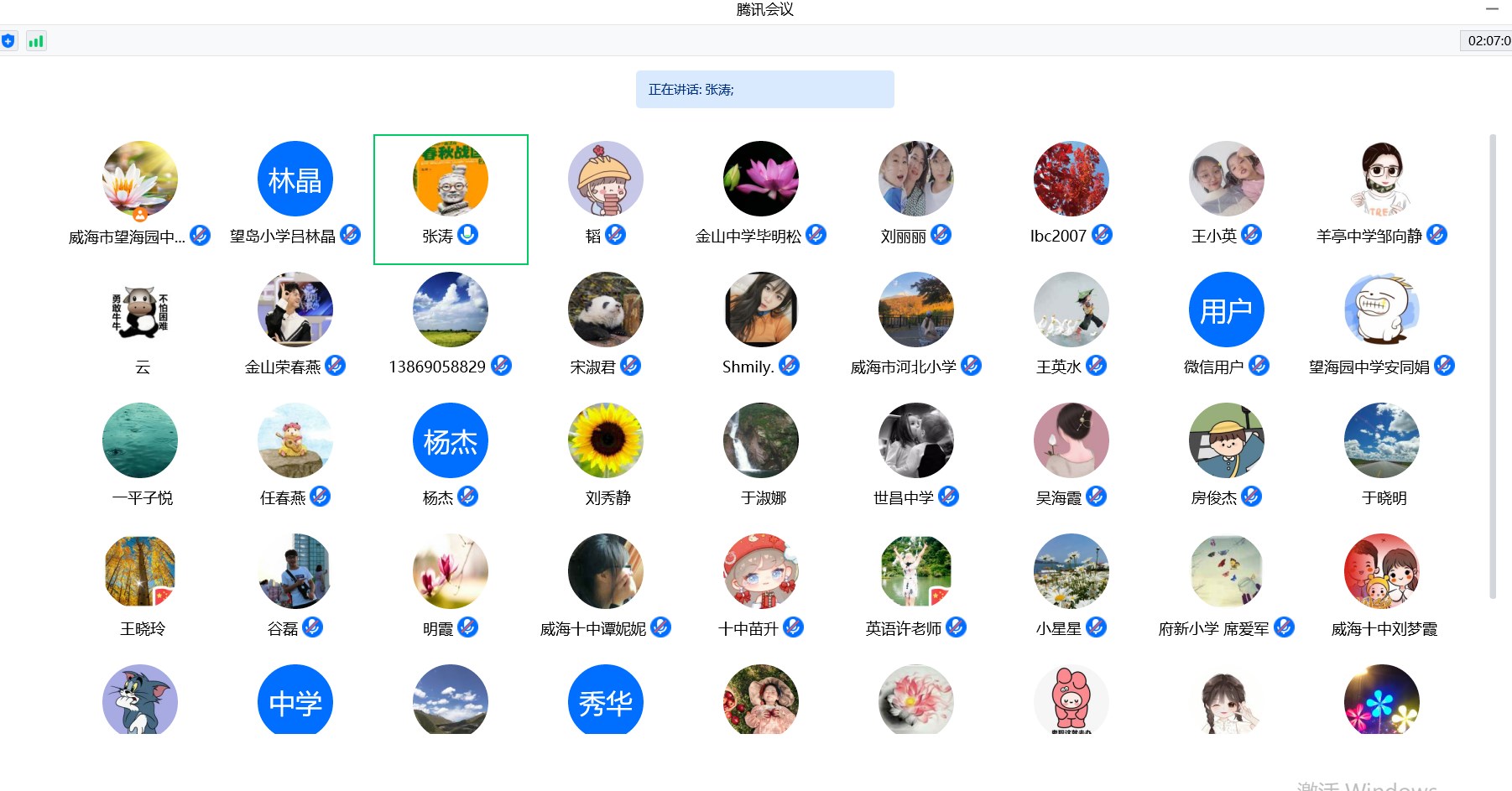为更好地推动各联盟实验校扎实有效地开展社会性科学议题学习研究,2023年4月19日晚7点,威海区域实验校联盟召开线上交流研讨会。会议由联盟秘书长于莲花副校长主持,SSI-L项目山东区域负责人、威海市教育教学研究院张涛主任以及威海市11所联盟校的校长、项目组组长、骨干教师共计50余人参加此次会议。

图1 于莲花秘书长主持会议
本次会议共分为二个议程。
在第一个议程中,各联盟校项目组组长交流了本校议题学习的师资安排、课时安排、参加学生安排和活动保障等方面的情况,并详细介绍了本校的选题,展示了议题的驱动性问题、五星图设计和具体活动设计。
本学期,威海世昌中学的选题是《威海是否有必要大力推广海洋牧场建设》,威海市望海园中学的选题是《家庭用水优选自来水还是其他净化水》,南海新区实验中学的选题是《小观蛤数量剧减任其自生还是人工干预》,荣成市府新小学的选题是《学校新建操场是选用天然草坪还是人工草坪》,威海市第十中学的选题是《使用融雪剂清雪有什么好处与坏处》,文登区金山中学的选题是《文登修建抽水蓄能电站亏不亏》和《该不该用融雪剂清雪》,威海市羊亭学校的选题是《羊亭湿地公园需不需要继续开发》,威海市明湖路学校的选题是《威海更适合采用风力发电还是水力发电》,威海市望岛小学的选题是《如何缓解校门口上下学交通拥堵问题》,威海市河北小学的选题是《烟花到底该不该禁止燃放》。

图2 联盟校项目组组长交流议题实施计划
在第二个议程,首先是各校项目组骨干教师就交流的内容积极展开研讨,指出议题选择和议题实施的亮点并提出改进建议。

图3 项目组骨干教师相互点评并提出建议
然后,张涛主任进行了专业点评。张主任对各学校取得的成绩给予了充分的肯定,他认为无论是首批实验校还是新加入的学校,议题的质量都非常高,活动的设计和实施基本都达到了较高的水准。对提出的问题提出了改进的建议,张主任的建议主要聚焦在以下几个方面:一是议题的选题是否符合社会性科学议题的特点;二是五星图的设计是否合理;三是活动的设计是否能针对性地解决问题,达成教学目标。
会议的最后,张涛主任对下阶段各联盟校议题的开展提出了五点要求:
1.各学校要借力本次研讨,尽快调整驱动性问题、完善五星图和活动设计。
2.各学校要抓紧时间实施议题项目,争取在学期末完成。
3.加强联盟校之间的交流与合作,通过联盟搭建的交流学习平台,遇到困难相互借力解决。
4要善于研究、勇于解决实施过程中遇到的困难和问题。
5.注意资料的积累与成果的梳理。

图4 张涛主任进行会议总结并提出要求
此次会议为各联盟校议题的研究和教学实践指明了方向,老师们对社会性科学议题的特点和活动开展有了进一步的认识,明确了下一阶段的工作目标和工作重点。
图文供稿:威海市望海园中学
On April 19, 2023, at 7 p.m., the Weihai Regional Experimental School Alliance held a webinar on SSI-L research, to better promote solid and effective research in alliance schools. The webinar was led by Yu Lianhua, the secretary-general of the alliance and the vice president. More than 50 guests attended the webinar, including Zhang Tao, the regional project leader in Shandong, the director of Weihai Education and Teaching Research Institute, and principals, project team leaders, and core teachers from 11 alliance schools in Weihai.
The meeting comprised two sections. In the first section, the leaders of the project teams from each alliance school shared details about the school’s teacher arrangements, class hours, student participation, and activity assurances for issue-based learning. They also discussed the chosen issues of the school and presented the driving questions, the five-star chart of the SSI teaching framework design, and specific activity plans.
This semester, the issue selected by Weihai Shichang Middle School was “Is it necessary to promote the construction of marine ranching vigorously in Weihai?”. The issue selected by Weihai Wanghai Park Middle School was “Should households prefer tap water or other purified water?”. Weihai Nanhai New Area Experimental Middle School chose the issue ” The number of Xiaoguan clams is drastically reduced, let it go or lend a hand?”. Rongcheng Fuxin Primary School’s selected issue was “Should the school build a new playground with natural lawn or artificial turf”. Weihai No.10 Middle School’s issue was “What are the pros and cons of using snowmelt agents to clear snow?”. Wendeng Jingshan Middle School’s selected issues were “Is it profitable to build a pumped storage power station in Wendeng?” and “Should snowmelt agents be used to clear snow?”. Weihai Yangting School’s selected issue was “Does Yangting Wetland Park need further development?”. Weihai Minghu Road School’s selected issue was “Which is more suitable for Weihai, wind power or hydropower?”. Weihai Wangdao Primary School’s selected issue was “How to alleviate the traffic congestion at the school gate during peak hours?”. Weihai Hebei Primary School’s selected issue was “Should fireworks be banned or not?”.
In the second section, the core teachers from project teams in each school engaged in a heated discussion on the content of their exchanges, indicating the highlights of the issue selection and implementation, and proposing suggestions for improvement.
Then, Director Zhang Tao made a professional review, giving full acknowledgment to the achievements of each school. He recognized that the quality of issues was very high, no matter designed by the first batch of experimental schools or newly joined schools. The design and implementation of the activities reached a relatively high level. He responded to the question raised and put forward suggestions, mainly focused on the following aspects: first, whether the selected issue was in line with the characteristics of SSI; second, whether the design of the five-star chart of SSI teaching framework was reasonable; third, whether the activity design targeted problem solving and could achieve teaching goals.
At the end of the meeting, Director Zhang Tao put forward five requirements for the next phase of the alliance school’s design and implementation of issues-based projects:
- Schools should draw support from this webinar, adjusting driving questions and improving the five-star chart design of SSI teaching framework and activity design with all haste.
- Schools should make the best use of time to implement issue-based projects, striving to complete them by the end of the semester.
- Intensify communications and cooperation among alliance schools through the exchange and learning platform set up by the alliance, and lend each other a hand in solving difficulties.
- Be adept in research, and be courageous in solving difficulties and problems encountered in the implementation process.
- Take notice of accumulating data and materials, and organizing the results and achievements.
This webinar provided guidance for the research and teaching practice of SSI among the alliance schools, enhanced teachers’ understanding of the characteristics and activity implementations of SSI, and clarified the goals and priorities for the next phase.
